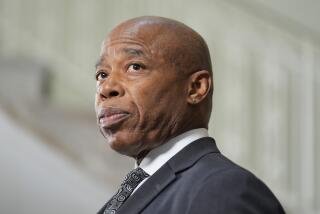Detroit’s Mayor Young on Ropes as Allegations Mount : Politics: He faces both a recall and federal inquiry. The civil rights advocate reportedly ran a secret business that sold South African gold coins.
- Share via
DETROIT — For a black political leader in America, the allegations publicly leveled against Detroit Mayor Coleman A. Young could hardly have been more embarrassing.
Young, the 71-year-old, five-term mayor of the nation’s sixth largest city and a longtime civil rights advocate, had reportedly helped establish, secretly, a private business that sold South African Krugerrands, the gold coins that symbolize apartheid to many Americans.
Young has heatedly denied any involvement in the coin sales but has refused to provide a detailed response in public. “I find it offensive that a lifelong reputation of over 50 years of struggle for human rights should be questioned,” he told reporters recently.
Yet Young’s current troubles go far beyond Krugerrands. In fact, just five months after he was reelected to an unprecedented fifth term in a landslide victory, Young now finds himself fighting for his political life.
A fledgling recall campaign has already begun. More importantly, a federal grand jury is now probing corruption in the city, Young may be forced to hunker down for a long legal battle against the FBI and the U.S. Attorney’s office in Detroit as they rummage through the police department and city government on the trail of a massive case of fraud and embezzlement.
Ross Parker, chief assistant U.S. attorney in Detroit, said Wednesday that the grand jury investigation of public corruption in Detroit is focusing on abuses in the use of a secret $1.4-million police fund supposedly established to allow undercover narcotics agents to make drug buys during their investigations. No official charges have yet been brought in the 10-month investigation, which is now being conducted jointly by the U.S. attorney, the FBI, the Internal Revenue Service, and the Wayne County, Mich., Prosecutor’s Office.
Young, who has always had a hostile relationship with the press, has sharply cut back on his meetings with reporters since the investigation first became public soon after last November’s election; he has even expressed support for a new boycott of two major Detroit media outlets.
“Our policy has been not to comment on what is a continuing investigation,” Young spokeswoman Teresa Blossom said.
But Young still must watch helplessly as the city’s media ask increasingly piercing questions about his Administration, questions that federal investigators are apparently asking as well:
Did the mayor use the drug fund to buy a television satellite dish for his mansion, and also for armor plating on his limousine?
Did the drug fund indirectly pay the rent on a posh home in Beverly Hills for the daughter of Young’s close ally, Detroit Police Chief William Hart?
And what exactly was Coleman Young’s relationship with one Kenneth Weiner? Why did Young set up a private company whose very existence was secret for years--with Weiner’s help?
Weiner is a shadowy figure who was briefly a civilian official in the Detroit Police Department and who eventually became a key informant for the federal investigators during their probe of Young’s Administration.
Weiner is now in jail facing fraud charges stemming from a separate investment scheme in which he allegedly bilked a group of affluent suburbanites. He apparently is no longer cooperating with federal investigators and perhaps may be trying to negotiate a new deal with them. Young has sought to distance himself from Weiner, but Weiner has still figured prominently in every new revelation that has emerged over the last few months.
Apparently with no prior police experience, Weiner became a civilian deputy police chief under Hart, supposedly providing “anti-terrorism” expertise to the city. But Weiner, whose father previously acted as an investment adviser to Young, quickly gained access through Hart to the secret drug fund.
Eventually, he set up at least three companies in California. Investigators allege that money from the secret drug fund found its way into those companies. One of the firms reportedly paid the rent on a home for Hart’s daughter. Hart has denied any knowledge of those payments.
Weiner also helped Young create his private company in a downtown Detroit office building, which apparently was the conduit for Krugerrand sales. A Detroit area coin dealer has told investigators that Weiner and Young’s personal attorney, Stanley Kirk, sold him $170,000 worth of coins, including Krugerrands, on behalf of Young’s firm, Detroit Technology & Investments.
More to Read
Get the L.A. Times Politics newsletter
Deeply reported insights into legislation, politics and policy from Sacramento, Washington and beyond. In your inbox twice per week.
You may occasionally receive promotional content from the Los Angeles Times.










